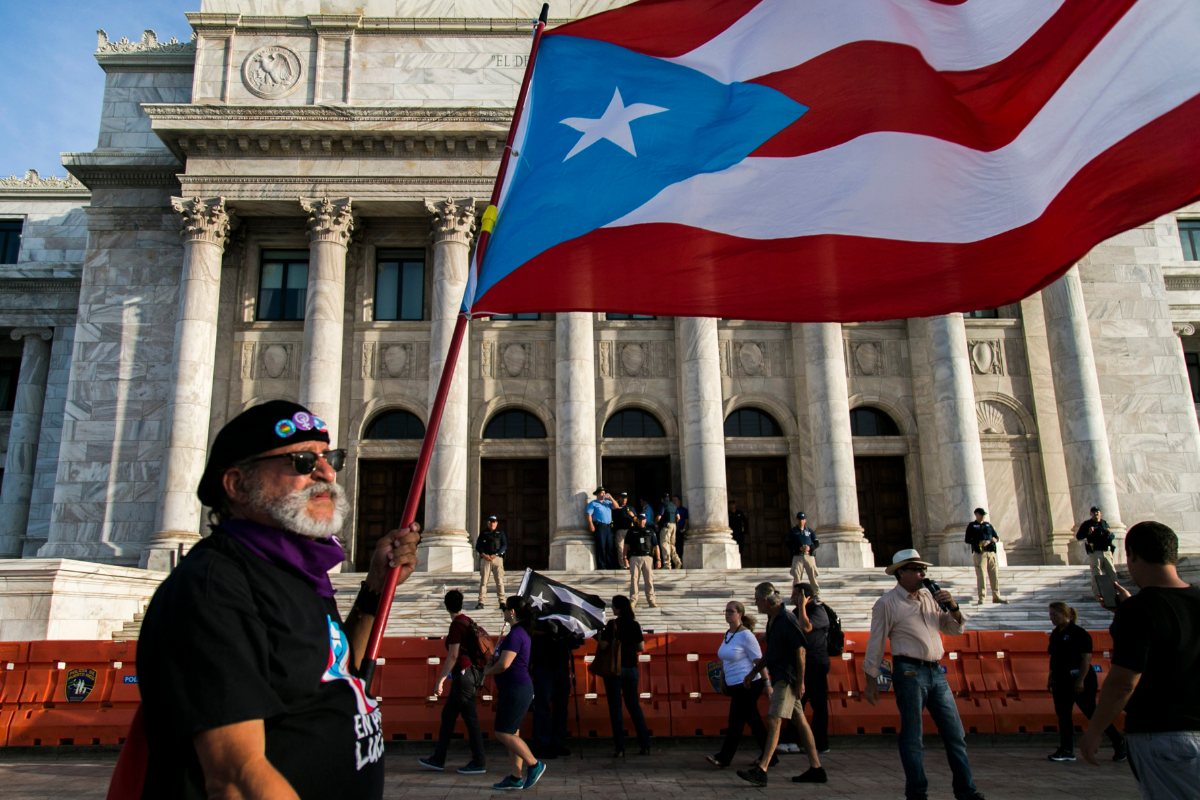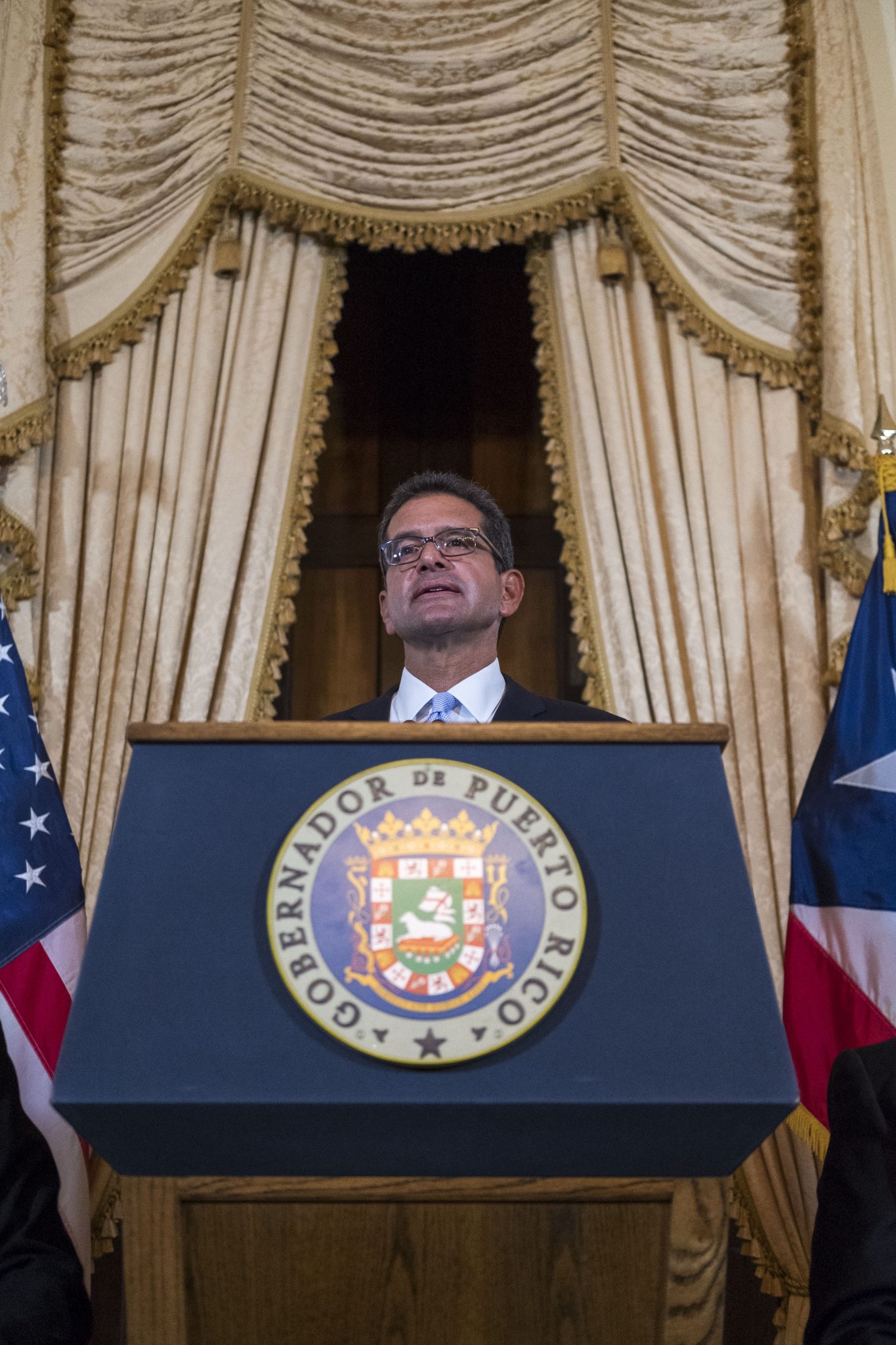

A demonstrator carries a Puerto Rican flag outside the Capitol where the Senate decided against the confirmation of Pedro Pierluisi as the new governor in San Juan, Puerto Rico, Monday, Aug. 5, 2019. (AP Photo/Dennis M. Rivera Pichardo)
By DÁNICA COTO, Associated Press
SAN JUAN, Puerto Rico (AP) — Attorneys submitted arguments by a Tuesday noon deadline in what many consider the biggest decision in the 119-year history of Puerto Rico’s Supreme Court: who will be the governor of the U.S. territory mired in political and economic turmoil.
After a sustained protest movement led to the resignation of the previous governor, the island’s 3.2 million people now await the final outcome of the constitutional deadlock pitting Puerto Rico’s Senate against Pedro Pierluisi, who was sworn in as governor late Friday.
“We don’t have any other choice except to wait,” said Rita Miranda, a 60-year-old condominium administrator. “We’re in a serious economic crisis, we’re in a serious social crisis, and this is making it worse.”
Puerto Rico’s nine-member Supreme Court was in summer recess when it decided to take up the lawsuit filed late Sunday by senators seeking a preliminary injunction ordering Pierluisi to immediately cease functioning as governor.
If the Supreme Court finds in favor of the Senate, Justice Secretary Wanda Vázquez would become governor, though she has said she doesn’t want the job.
Pierluisi was named secretary of state while the legislature was out of session last week, and only the House approved his recess appointment. The lawsuit also asks the court to declare unconstitutional a 2005 law saying a secretary of state need not be approved by both the House and Senate if he or she has to step in as governor.
Puerto Rico’s constitution, it notes, says a secretary of state must be approved by both chambers.
It was not clear whether the Supreme Court would hold a hearing or simply issue a written opinion. There is no deadline, though legal experts expect a decision within days.
A ruling will be final and cannot be appealed, with a majority of five judges required to declare a law unconstitutional. Six of the nine judges were appointed by governors from Pierluisi’s party, the pro-statehood New Progressive Party, and three by the main opposition Popular Democratic Party. The senator leading the effort against Pierluisi is also a member of the NPP.


Pedro Pierluisi, sworn in as Puerto Rico’s governor, attends a press conference in San Juan, Puerto Rico, Friday, Aug. 2, 2019. (AP Photo/Dennis M. Rivera Pichardo)
In a 14-page filing, attorneys for Pierluisi accused the Senate of contributing to the island’s political instability and noted it had the opportunity to vote on Pierluisi’s nomination but did not do so.
“Puerto Rico is embarking on a traumatic episode of high political tension that, unquestionably, aggravates the economic crisis that it has been going through for more than a decade, places at risk efforts to recover from the ravages of Hurricanes Irma and María (and) adversely affects relations with the federal government,” the filing states.
Some Puerto Ricans were dismayed that after a mass protest movement successfully led to the resignation of Gov. Ricardo Rosselló, the question of his successor now lies in the hands of a court.
“It was a possible outcome, but certainly sad because for three weeks the island took to the streets in a historic, forceful way to peacefully overthrow a governor, and now this is left to a majority of nine people who are also nine people named and approved by politicians?” said Sen. Juan Dalmau of the Puerto Rican Independence Party. “That is another constitutional defect.”
Dalmau submitted a bill Tuesday that would allow Puerto Rico to hold a special election if a governor were to step down, saying it’s a move to uphold democracy.
Rosselló formally resigned August 2 following nearly two weeks of demonstrations amid anger over corruption, mismanagement of funds and a leaked obscenity-laced chat in which he and 11 other men including government officials mocked women, gay people and victims of Hurricane María, among others. More than two dozen officials resigned in the wake of the chat, including former Secretary of State Luis Rivera Marín.
Puerto Ricans have already protested against Vázquez, who would take over if Pierluisi is removed, and vowed to take to the streets again if they aren’t satisfied with the court’s decision.
“I hope Pierluisi gets to stay,” said Marta Sánchez, who is 64 and unemployed. “You can tell he’s a serious man who is capable of leading Puerto Rico.”
Manuel Vázquez, a 70-year-old handyman who was walking while reading a newspaper, agreed.
“He has the skills to lead the island,” he said, though he added that he is content to have the court decide.
Pierluisi is a 60-year-old attorney who served as Puerto Rico’s non-voting representative to the U.S. Congress from 2009 to 2017 and lost to Rosselló in the 2016 gubernatorial primary. He also served as justice secretary under Rosselló’s father, Pedro Rosselló, when he was governor.
Pierluisi issued a statement saying he will respect the court’s ruling, “trusting that what is best for Puerto Rico will prevail.”
Opponents say having Pierliusi as governor presents a serious conflict of interest. He worked for a firm that represented the federal control board overseeing the island’s finances amid a 13-year recession, and his brother-in-law is chairman of the board that Congress created to oversee the restructuring of some of the island’s more than $70 billion in public debt after Puerto Rico declared a form of bankruptcy.
In addition, critics allege he seized the governorship without following the law. A widely respected attorneys’ organization has accused Pierluisi of “hijacking” the constitution.
Mario Juan, a 32-year-old food truck owner who took part in the massive protests, said he felt powerless that the issue is up to the court.
“It’s already a victory that the people of Puerto Rico participated so actively,” he said, but “this will have an ending that will satisfy no one.”


